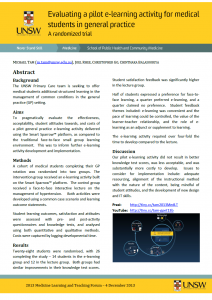 This a paper presentation at the 2013 Medicine Learning and Teaching Forum, held at the University of New South Wales on 4 December 2013.
This a paper presentation at the 2013 Medicine Learning and Teaching Forum, held at the University of New South Wales on 4 December 2013.
Authors:
- Dr Michael Tam
- Dr Joel Rhee
- Mr Christopher Go
- Dr Chinthaka Balasooriya
Abstract
Background
The UNSW Primary Care team is seeking to offer medical students additional structured learning in the management of common conditions in the general practice (GP) setting.
Aims
To pragmatically evaluate the effectiveness, acceptability, student attitudes towards, and costs of a pilot general practice e-learning activity delivered using the Smart Sparrow™ platform, as compared to the traditional face-to-face small group learning environment. This was to inform further e-learning activity development and implementation.
Methods
A cohort of medical students completing their GP rotation was randomised into two groups. The intervention group received an e-learning activity built on the Smart Sparrow™ platform. The control group received a face-to-face interactive lecture on the management of hypertension. Both activities were developed using a common case scenario and learning outcome statements.
Student learning outcomes, satisfaction and attitudes were assessed with pre- and post-activity questionnaires and knowledge tests, and analysed using both quantitative and qualitative methods. Costs were captured by logging developmental time.
Results
Twenty-eight students were randomised, with 26 completing the study – 14 students in the e-learning group and 12 in the lecture group. Both groups had similar improvements in their knowledge test scores. Student satisfaction feedback was significantly higher in the lecture group.
Half of students expressed a preference for face-to-face learning, a quarter preferred e-learning, and a quarter claimed no preference. Student feedback themes included: e-learning was convenient and the pace of learning could be controlled, the value of the learner-teacher relationship, and the role of e-learning as an adjunct or supplement to learning.
The e-learning activity required over four-fold the time to develop compared to the lecture.
Discussion
Our pilot e-learning activity did not result in better knowledge test scores, was less acceptable, and was substantially more costly to develop. Issues to consider for implementation include: adequate resourcing, alignment of the instructional method with the nature of the content, being mindful of student attitudes, and the development of new design and IT skills.
